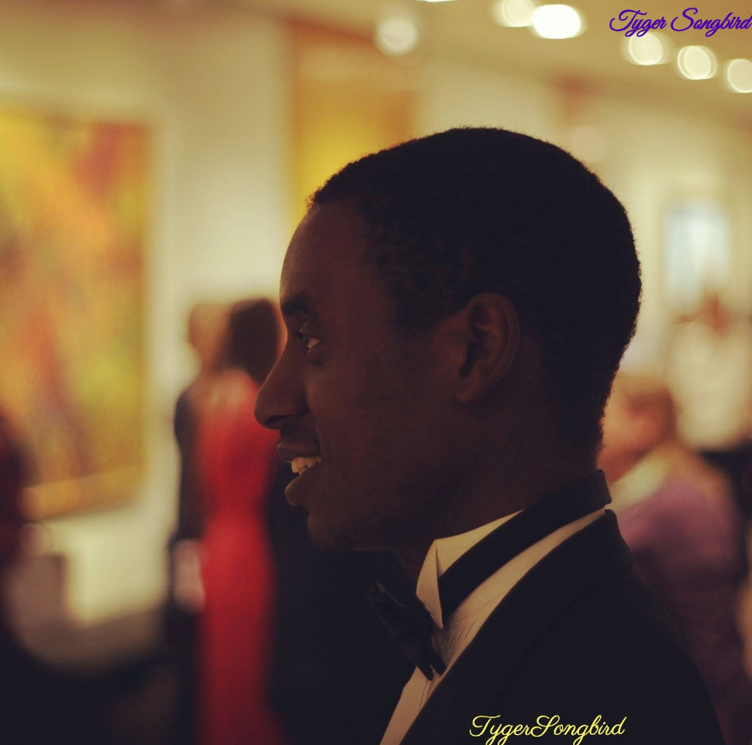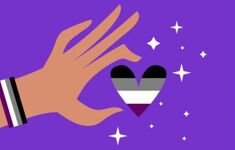
I turned 33 years old in May. I celebrated the occasion with friends, spending the night on the town and having a blast.
My 33rd birthday was a significant birthday for me for two reasons. For starters, my birthday marked seven years since officially discovering I’m asexual. My asexual journey was a long-winding road full of angst, introspection, and inner turmoil, culminating in joy and a newly discovered self. I was so glad I could celebrate the occasion with my best friends supporting me.
Related:
It is time to start celebrating Black asexuality in media
So far, ace representation has mostly involved white male characters who tend to be socially awkward and perpetuate harmful stereotypes.
Birthday number 33 was also large for a second reason: It marked me turning into what I had deemed as “a Jesus virgin,” as Jesus was a 33-year-old virgin when he died (presumably).
Dive deeper every day
Join our newsletter for thought-provoking commentary that goes beyond the surface of LGBTQ+ issues
I mean it as tongue-in-cheek, obviously.
That being said, yes, as of today, I am officially a 33-year-old virgin. Do I say that with a sense of pride? Not really. Not having sex comes naturally to me as a sex-repulsed asexual. It’s just my default, you could say.
What I am proud of is that I didn’t have sex to appease everyone’s demands. I’m more proud I didn’t cave to peer pressure and just “give it up” in order to fit in with societal expectations. That’s what I’m more proud of.
That being said, I’m much more proud to be asexual. Finding out I’m asexual helped everything come into synergy for me.
My journey to accepting asexuality is tied to accepting being a virgin. Before finding out that I am asexual, I felt immense pressure to have to lose my virginity to keep up with my peers. Even though I never truly wanted to have sex and expressed my desire to never engage in it, I felt pressured by peers, family, and society to partake in the act.
It was not until discovering I’m asexual that I finally found freedom—not only from social and peer pressure but to be myself.
I have been on the end of virgin-shaming many times in my life. I know what it’s like to be called a “prude,” a “wuss,” and a “loser,” like male virgins get called by society in general. I know how virgin-shaming can lead to despair because society keeps calling adult virgins losers.
Seeing the media perpetuate stereotypes about virgins doesn’t help either.
Take, for instance, this scene from Grey’s Anatomy, where the hospital staff begins making fun of the character April because she feels pressure to lie about being a virgin.
Television shows like Glee, Grey’s Anatomy, and many others have perpetuated the stereotype that characters who have not had sex are naive, frigid, uptight, boring, unattractive prudes.
There have been movies that have made mockery of virgins its central theme.
Andy Stitzer (played by Steve Carrell) from The 40-Year-Old Virgin is mocked as being “infantile” and “childish” because he would rather collect action figures and play video games instead of chasing sex.
Josie Geller, Drew Barrymore’s character from the 1999 film Never Been Kissed, was bullied and mockingly called “Josie Grossie” for being smart and being a member of the academic team in high school.
Both The 40-Year-Old Virgin and Never Been Kissed portray their main characters as socially awkward losers who everyone should pity because they are so pitiful.
It doesn’t matter that Josie Geller graduated at the top of her class, graduated from Northwestern, became the youngest copy editor in the history of a well-respected newspaper, and can quote Shakespeare and Virgil with relative ease.
It doesn’t matter that Andy Stitzer made so much money that he could afford to live on his own and buy collectors’ item action figures that would later resell at six-figures.
It doesn’t matter that both characters were, for the most part, happy being the person that they are. It doesn’t matter that they had different ideas about sex and romance from their more sexually active contemporaries.
It doesn’t matter.
Both The 40-Year-Old Virgin and Never Been Kissed cast aspersions on their characters for not being sexually experienced, reducing their characters’ personas to what they have or haven’t done with their genitals. These aspersions rely on three premises:
- Everyone wants sex, with no exceptions
- Those who haven’t must be miserable for not doing so
- Those who don’t want to have sex must have had a bad sexual experience or have some disorder that needs to be “fixed” and “corrected”
These same virgin-shaming aspersions also adversely affect asexual people like me.
Virgin-shaming greatly harms asexual people, helping fuel corrective rape and consummation laws. Society’s pedestalization of sex only helps fuel concepts like compulsory sexuality, thus removing the ability for everyone to choose the sex lives they wish to have, if any.
Virgin-shaming reinforces toxic societal scripts that strip human individuality, stating that every single person has to engage in sex on a particular timeline to fulfill arbitrary benchmarks of normalcy.
Under compulsory sexuality reinforced by virgin-shaming, nobody gets to make decisions regarding their bodily autonomy. Rather, everyone is in a rat race of sorts to “score” sexually and be considered a winner.
Therein lies the toxicity.
For so long, there has existed a blind spot in society regarding virgin-shaming—not just in religious circles but also sex-positive feminist circles.
In my interview with award-winning podcaster Aline Laurent-Mayard, Aline discussed how they struggled with feeling like they are a “good feminist” because they are asexual. They discussed how during the sexual revolution of the 60s and 70s, sex was a form of liberation in feminism, as owning and enacting one’s sexuality was seen as a form of deshackling from patriarchal norms surrounding sex. Early feminism did not have a place for asexuality in it.
Angela Chen noted this contradiction in sex-positive feminism in her book Ace: What Asexuality Reveals About Desire, Society, and the Meaning of Sex:
Conspicuous consumption of sex has become a way to perform feminist politics… It seems that the message is ‘have as much sex as we want’… except ‘as much as we want’ is always lots of sex and not no sex, because then we are oppressed, or possibly repressed, and we’re either not being our true authentic selves, or we haven’t discovered the crucial side of ourselves that is our sexuality in relation to other people, or we haven’t grown up properly or awakened yet.
Chen is far from the only person saying this. Many other prominent asexual writers have written about compulsory sexuality. However, in her book, she states it so eloquently. Instead of addressing the problem of compulsory sexuality, sex-positive feminism overcorrected, which “only redistributes the shame and the stigma” to those who choose not to partake in sex, according to Chen. This thereby hinders true sexual freedom for everyone regardless of sexual orientation.
This is why I say virgin-shaming, like slut-shaming, needs to die. Virgin-shaming hurts everyone, as it prevents everyone from having true bodily autonomy, from being able to choose whatever type of sex they want, if any.
Until we have a society where virgin-shaming is erased for good and people can choose not to have sex – free of reprisal or judgment – no person shall truly be sexually liberated, including asexual people like me.
Don't forget to share:















Virgin-shaming hurts everyone, including asexual people like me